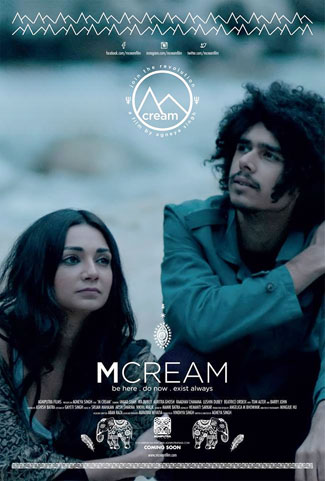 In writer-director Agneya Singh’s first feature film, M Cream, four entitled, privileged Delhi twenty-somethings — Maggie (Auritra Ghosh), Niz (Raaghav Chanana), Jay (Ira Dubey) and Figs (Imaad Shah) head off on a road trip in search of a mythical drug, M Cream. Along the way, they have the opportunity to explore political issues, hook up with an aging American hippie (played by theatre director Barry John), attend a rave, take an LSD trip in an orange grove, write some poetry, and save some trees.
In writer-director Agneya Singh’s first feature film, M Cream, four entitled, privileged Delhi twenty-somethings — Maggie (Auritra Ghosh), Niz (Raaghav Chanana), Jay (Ira Dubey) and Figs (Imaad Shah) head off on a road trip in search of a mythical drug, M Cream. Along the way, they have the opportunity to explore political issues, hook up with an aging American hippie (played by theatre director Barry John), attend a rave, take an LSD trip in an orange grove, write some poetry, and save some trees.
Singh’s film attempts to explore the effects of a changing India on his own young generation, and wants to show us how they, as a generation, navigate and make sense of those changes, and how they learn to adapt to the world – or, how they make their world adapt to them.
The film asks, in a sense, what it means to be a rebel or a revolutionary. Is it as simple as wearing a t-shirt, as Figs does, that reads “Hardcore Rebel”? Does it mean taking up causes that aren’t your own (like Jay)? Or to go against the wishes of your parents to go to a good school and become a lawyer (which Figs seems on track to do)? Does it mean wasting your days and nights swigging from a bottle of Old Monk and scoring some hash? Writing poetry? And what is the meaning of life, anyway? Maybe it’s none of these things. Maybe it’s all of them.
“You’ve got to stop running if you really want to find what you’re looking for!” is the advice his father (played by Bollywood veteran Tom Alter) gives Figs as he jumps into Maggie’s jeep and sets off with her, Niz, and Jay. Their biggest concern setting out is that there’ll be enough booze for the trip.
Despite the fact that I couldn’t initially connect with Figs, as the film progressed, I actually found him kind of interesting and at times, likeable. The performance of Imaad Shah (he’s the son of film and theatre veterans Naseeruddin Shah and Ratna Pathak Shah) manages to breathe some life into a character that could have remained as a series of check boxes ticked off to create the modern rebel. (Drinks Old Monk? Check. Spouts poetry? Check. Ponders the meaning of life? Check. Turn on, tune in, drop out? Check, check and check.) It’s the same for Ira Dubey’s Jay – I love Ira Dubey, and her handling of Jay is deft. The moments when she and Imaad Shah share the screen are the film’s best.
M Cream falters when these clichés and stereotypes drive the roadtrip (aging American hippie living in a commune in India? Check.); fortunately, these moments are, if not rare, at least held in check. Where M Cream works particularly well, though, is when it either pokes holes in these clichés, or when it uses them to reveal that sometimes there are more to them than meets the eye.
I do think, though, that M Cream is a film that is best experienced in a cinema, where you can take your seat, let the dark descend, and allow yourself to be swept into the world of Figs and Jay, in particular. Both of these characters reveal themselves to be thoughtful and likeable – they are, as Jay points out early in their acquaintanceship, more alike than they would at first seem. And M Cream, thankfully, doesn’t show enlightenment as something that you come to via an acid trip in an orange grove, or by writing poetry on the road. Jay and Figs don’t actually change much on this trip, but they do grow, at least in their appreciation of each other. “Before this, the world was all in black and white,” says Jay at one point, “and now there’s all this COLOUR.” Figs realizes, that for him, the world was all about colour, but he’s learning to see black and white. Somehow, this revolution contains a notion of balance.
Perhaps Agneya Singh is right – there is something different in how his generation chooses to rebel. M Cream’s tag line is “Be here. Do now. Exist Always.” I think I’d add, as Fig says at the end of the journey, “And now what?”









